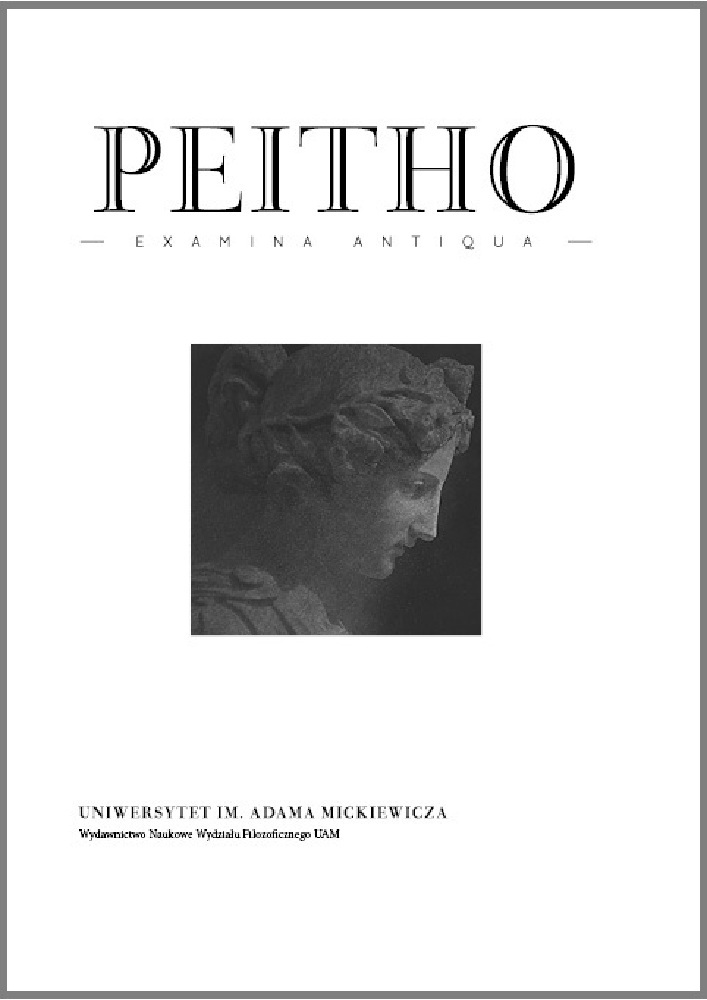Abstract
The present paper argues that the early Pythagoreans contributed significantly to the development of ancient hermeneutics. The article builds on the assumption that even if the thinkers did not deal with allegoresis directly, the very manner of articulating their thought was, nevertheless, quite conducive to the growth of allegorical interpretation. Thus, at least indirectly, Pythagoreanism must have played an important role in the development of allegoresis. The paper identifies two crucial aspects of Pythagorean influence on the allegorical tradition. Firstly, the Pythagoreans made a very specific use of the poetry of Homer and Hesiod as well as of the traditional mythology in general. Secondly, the teachings of Pythagoras were expressed in terms of various ambiguous symbols that required special exegesis. Both these factors must have contributed considerably to the development of allegoresis: the idiosyncratic use of conventional mythology, on the one hand, and the enigmatic nature of the Pythagorean symbols, on the other, must have provoked extensive search for the latent (i.e., “allegorical”) meaning of the “messages” in question.
References
Adler, A., Suidae lexicon, vol. I–IV, Leipzig 1928–1935 (repr. Stuttgart: 1967–1971).
Aristotele, Frammenti. Opere logiche e filosofiche, introduzione, traduzione e commento di M. Zanatta, Milano 2010.
Aristoteles, Fragmenta selecta, ed. W.D. Ross, Oxford 1925 (repr. 1955).
Asclepio di Tralle, Commentario al libro «Alpha meizon» (A) della «Metafisica» di Aristotele. Introduzione, testo greco, traduzione e note di commento di R. Loredana Cardullo, Acireale-Roma 2012.
Asclepius, In Aristotelis Metaphysicorum libros A-Z commentaria, ed. M. Hayduck, Berlin 1888 (repr. 1960).
Clemens Alexandrinus, Stromata, ed. O. Stählin, vol. I–II, Leipzig 1906–1909.
Diels, H., Kranz, W., Die Fragmente der Vorsokratiker, vol. I–III, Berlin 1951–1952 (repr. Dublin 1966).
Diogenes Laertius, Vitae philosophorum, ed. H.S. Long, Oxford 1964 (repr. 1966).
Giamblico, La vita pitagorica, introduzione, traduzione e note di M. Giangiulio, Milano 1991.
Iamblichus, De vita Pythagorica, ed. L. Deubner, U. Klein, Leipzig 1937 (repr. Stuttgart 1975).
I Presocratici, Prima traduzione integrale con testi orignali a fronte delle Testimonianze e dei Frammenti nella raccolta di Hermann Diels e Walter Kranz, a cura di G. Reale, con la collaborazione di D. Fusaro, M. Migliori, S. Obinu, I. Ramelli, M. Timpanaro Cardini, A. Tonelli, Milano 2006.
Porfirio, Vita di Pitagora, Monografia introduttiva e analisi filologica, traduzione e note di A.R. Sodano, Saggio
preliminare e interpretazione filosofica, notizia biografica, parole chiave e indici di G. Girgenti, Milano 1998.
Porphyrius, Vita Pythagorae, ed. A. Nauck, Leipzig 1886 (repr. Hildesheim 1963).
Xenophon, Opera omnia, ed. E.C. Marchant, vol. II, Oxford 1921 (repr. 1971).
Boyancé, P., 1937, Le culte des Muses chez les philosophes grecs. Études d’histoire et de psychologie religieuses, Paris.
Buffière, F., 1956, Les Mythes d’Homère et la pensée grecque, Paris.
Burkert, W., 1972, Lore and Science in Ancient Pythagoreanism, transl. E.L. Minar, Cambridge, M.A.
Carcopino, J., 1956, De Pythagore aux Apôtres. Études sur la conversion du monde romain, Paris.
Delatte, A., 1915, Études sur la littérature pythagoricienne, Paris.
Despotopoulos, K. I., 1994, Lexicon of Presocratic Philosophy [ΛΕΞΙΚΟΝ ΤΗΣ ΠΡΟΣΩΚΡΑΤΙΚΗΣ ΦΙΛΟΣΟΦΙΑΣ], vol. 2, Κ-Ω, ΑΘΗΝΑΙ [Athens].
Detienne, M., 1962, Homère, Hésiode et Pythagore. Poésie et philosophie dans le pythagorisme ancien, Bruxelles.
Domaradzki, M., 2010, “Allegoresis In the Fifth Century BC”, Eos. Commentarii Societatis Philologae Polonorum 97 (2), pp. 233–248.
Domaradzki, M., 2011, “Theagenes of Rhegium and the Rise of Allegorical Interpretation”, Elenchos. Rivista di studi sul pensiero antico 32 (2), pp. 205–227.
Domaradzki, M., 2012, “Theological Etymologizing in the Early Stoa”, Kernos. Revue internationale et pluridisciplinaire de religion grecque antique 25, pp. 125–148.
Lamberton, R., 1986, Homer the Theologian: Neoplatonist Allegorical Reading and the Growth of the Epic Tradition, Berkeley, CA.
Müri, W., 1976, “ΣΥΜΒΟΛΟΝ. Wort- und sachgeschichtliche Studie”, in: Idem, Griechische Studien. Ausgewählte wort- und sachgeschichtliche Forschungen zur Antike (Schweizerische Beiträge zur Altertumswissenschaft 15), E. Vischer (Hg.), Basel, pp. 1–44 [repr. Beilage zum Jahresbericht über das städtische Gymnasium in Bern, Bern 1931, pp. 1–46].
Pépin, J., 1976, Mythe et allégorie: Les origines grecques et les contestations judéo-chrétiennes, Paris.
Ramelli, I., Lucchetta, G., 2004, Allegoria, vol. 1: L’età classica, Milano.
Richardson, N. J., 2006, “Homeric Professors in the Age of the Sophists”, in: A. Laird, (ed.), Oxford Readings in Ancient Literary Criticism, Oxford, pp. 62–86 [repr. Proceedings of the Cambridge Philological Society 201, 1975, pp. 65–81].
Struck, P. T., 2004, Birth of the Symbol: Ancient Readers at the Limits of Their Texts, Princeton.
Wehrli, F., 1928, Zur Geschichte der allegorischen Deutung Homers im Altertum, Borna/Leipzig.
Zhmud, L., 2012, Pythagoras and the Early Pythagoreans, transl. K. Windle & R. Ireland, Oxford.
License
Peitho provides immediate open access to its content on the principle that making research freely available to the public supports a greater global exchange of knowledge.
